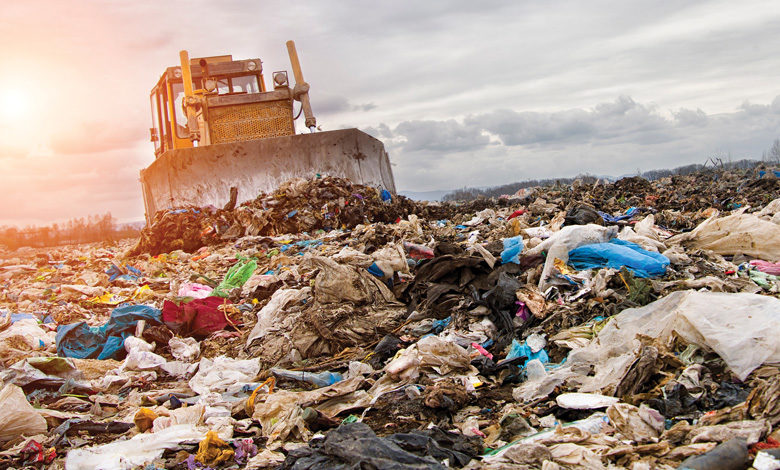Waste management strategy by 2023

A new waste management strategy, which could seek to limit waste to landfill levels to just 10 per cent by 2035, will be published by the end 2023.
The Department of Agriculture, Environment and Rural Affairs has launched a pre-consultation stakeholder engagement process, with the aim of launching a public consultation on the draft strategy in the second quarter of 2023.
The new strategy, according to the recently-departed Minister for Agriculture, Environment and Rural Affairs, Edwin Poots MLA, will set the policy direction for the future management of waste in Northern Ireland for the next six years.
Northern Ireland’s last waste strategy Delivering Resource Efficiency was published in 2013. A closure report published in June 2022 meant that governance arrangements for the strategy, including completion of its monitoring and reporting arrangements, concluded.
Waste Framework Directive (2008/98/EC), retained, post-Brexit, the establishment of one or more waste management plans. In Northern Ireland this requirement is currently fulfilled through the Waste Management Plan for Northern Ireland published by the Department in 2019. The plan includes the Northern Ireland waste management strategy and the regional waste management plans prepared by the three district council waste management groups.
Strategy strands and legal requirements
The consultation document outlines a list of legal requirements which the upcoming strategy must ensure are taken into account, including ensuring that it is in accordance with the waste hierarchy, protection of human health and the environment, and principles of self-sufficiency and proximity.
There is a proposal in the development of the strategy that there must be strong consultation with district councils, devolved adminstrations, UK Government, and others, which should also be given an early and effective opportunity to express their opinions on the proposals.
Conformation to the current plan for the reduction of biodegradable waste going to landfill is seen as key, in addition to analysis of the current waste management situation. There is also support for a chapter in the strategy on the management of packaging and packaging waste.
There have been discussions to include measures which aim to promote preparing for re-use, promote high quality recycling, including the setting up of separate collections of waste, containing its policies in relation to the recovery and disposal of waste, as well as encouraging the recycling, including composting and digestion, of bio-waste.
The consultation document outlines the strategy strands which must underpin the future strategy over the various processes prior to the publication of the strategy, scheduled for December 2023. The first of which is the “need for change: strategic context”, as well as a strand for sustainable production which will be focussed on achieving a circular economy and meeting Northern Ireland’s net zero commitments.
Complementary to the aims of increasing the circularity of the Northern Ireland economy is avoiding waste by means of prevention and encouraging re-use of products, in addition to maximising the retention of resources via recycling.
Paramount to all of this is the proposed strand of “extracting value and preventing harm” by other recovery and disposal methods, which are not as of yet specifically outlined. Changing attitudes and behaviours is another strand via communication and educational methods.
Whilst there is some legislation in place already, such as the Climate Change Act, the document states that there is a need for additional robust legislation, along with the accompanying regulation and enforcement.
The final two strands outlined in the document include the supporting innovative methods such as the use of data, research, and infrastructure, in addition to ensuring that the proper monitoring infrastructure is in place.
Proposed actions
At the engagement stakeholder event, some of the proposed actions on waste management include a target to send no more than 10 per cent of Northern Ireland’s waste to landfills by 2035, as well as a further proposal to introduce legislation to reduce the consumption of single-use plastic items.
There were further engagements surrounding the implementation of the upcoming Extended Producer Responsibility Scheme for Packaging, which will be introduced by the UK Government in 2023. Additionally, there were discussions on the viability of introducing a deposit return scheme in Northern Ireland by the middle of this decade.
Increasing the circularity of the Northern Ireland economy is seen as a complementary action to the reduction of waste. Currently, Northern Ireland has a circularity gap of 92 per cent, although a study by Circle Economy has found that the circularity gap can be viably reduced to 84 per cent by 2032.
Northern Ireland currently has a footprint of carbon waste which is double the world average. Circularity would involve the recycling of materials, and the reductions which can viably be achieved have the half the material footprint currently put out in Northern Ireland, although there are concerns of the ramifications for the economy in this event, given the wide transition which is needed in the labour market in order to facilitate this.





